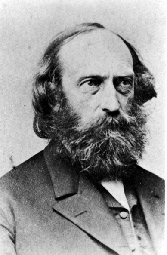Stephen Pearl Andrews facts for kids
Quick facts for kids
Stephen Pearl Andrews
|
|
|---|---|
 |
|
| Born | April 22, 1812 |
| Died | May 21, 1886 (aged 74) |
| Nationality | American |
| Occupation | Activist, journalist, philosopher, writer |
| Known for | American individualist anarchist and outspoken abolitionist |
Stephen Pearl Andrews (born March 22, 1812 – died May 21, 1886) was an American thinker, writer, and activist. He was known for his ideas on individual freedom and for speaking out against slavery. He also wrote several books about workers' rights and a type of political thought called individualist anarchism, which focuses on personal liberty. Andrews was also a talented linguist, meaning he was good with languages.
Early Life and Important Work
Andrews was born in Templeton, Massachusetts, on March 22, 1812. He was the youngest of eight children. He grew up in Hinsdale, New Hampshire. When he was 19, Andrews moved to Louisiana to study and practice law. He was very upset by slavery and became an abolitionist, someone who wanted to end slavery. Because of his strong beliefs, he and his family had to leave Texas in 1843 after he gave speeches against slavery. He even traveled to England to try and get support for the abolitionist movement, but he wasn't successful.
While in England, Andrews became very interested in a new way of writing called shorthand, invented by Isaac Pitman. Shorthand is a fast way to write using symbols. When he returned to the United States, Andrews taught and wrote about shorthand. He even created his own popular system for writing down speeches quickly. To help people learn, he published instruction books and edited two magazines.
Andrews also created his own "scientific" language called Alwato. He liked to use this language when talking and writing to his students. He was working on a dictionary for Alwato when he died, which was published later. He was an amazing linguist and taught himself at least 32 different languages!
By the late 1840s, Andrews started focusing on creating ideal communities, sometimes called "utopian communities." He was inspired by another individualist thinker, Josiah Warren. In 1851, they started a community called Modern Times in Brentwood, New York. In 1846, he was chosen as an Associate Fellow of the American Academy of Arts and Sciences, which is a group that honors smart people.
Later, in 1857, Andrews started Unity Home in New York City. By the 1860s, he was talking about an ideal society called pantarchy, where government would be voluntary and connected to a "New Catholic Church." From this, he developed a philosophy he called universology, which focused on how all knowledge and activities are connected. He was also one of the first Americans to learn about Karl Marx and helped publish Marx's famous book, Communist Manifesto, in the United States.
Andrews was one of the first people to use the word "scientology" in his 1871 book. In the 1870s, he also supported Joseph Rodes Buchanan's idea of psychometry, which is a belief that you can learn about an object's past by touching it. Andrews also believed that knowledge gained from thinking (called a priori) would become more important than knowledge gained from experiments (called empirical science). He was also a leader in the religious movement of spiritualism, which involves communicating with spirits. A famous thinker named Rudolf Rocker called Andrews an important supporter of libertarian socialism in the United States.
The Power of the Individual
Andrews wrote a lot about the idea of the sovereignty of the individual, which means that each person has the right to control their own life and make their own choices. He believed this idea was very important for how society should work.
In his book The Science of Society, he explained that movements like Protestantism (a type of Christianity), Democracy (where people vote for their leaders), and Socialism (where society works together for everyone's benefit) all share one main idea: the power of the individual. He thought that this idea of individual freedom is the most important principle behind all progress and change in the world.
Andrews believed that when individuals respect each other's freedom, it helps them get along well, just like countries get along better when they respect each other's independence.
Fair Wages for Work
Andrews supported a system for jobs and pay based on what he called labor notes. He thought that in the capitalist system of his time, people were not paid fairly for the work they did.
He believed it was right for one person to hire another and pay them wages. He also thought it was fine for a boss to direct workers. However, Andrews felt the problem was that workers were not paid justly.
For Andrews, being paid "justly" meant being paid according to the "Cost Principle." This idea said that people should be paid based on how much effort or labor they put in, not based on how much benefit someone else gets from their work. To make this simpler, he suggested using labor notes. These were like a type of money marked in hours of labor. This way, a worker's pay would be based on how much they worked, not on how much their employer valued the work.
Because of these ideas, Andrews also believed that people should not be paid interest for lending money. He didn't see lending money as requiring labor or a sacrifice from the lender. Andrews' ideas about fair pay and labor notes are part of what is known as economic mutualism, a type of individualist anarchism.
See also
In Spanish: Stephen Pearl Andrews para niños
 | Stephanie Wilson |
 | Charles Bolden |
 | Ronald McNair |
 | Frederick D. Gregory |

